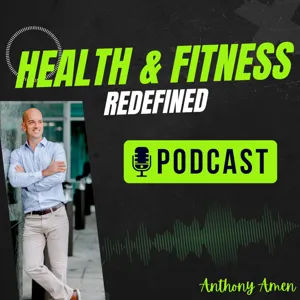Podcast Summary
Hacking Jet Lag: Strategies for Adjusting to New Time Zones: Expose yourself to morning daylight, eat meals at regular times, and wear shades in the afternoon to help adjust to new time zones faster
Rangan Chatterjee and Professor Matthew Walker is that understanding how our body adjusts to new time zones and implementing certain strategies can help us hack jet lag and adjust faster. According to Professor Walker, for every day spent in a new time zone, our body can catch up by about one hour. However, this process can be sped up by getting daylight exposure in the morning and eating meals at regular times in the new time zone. Conversely, wearing shades in the afternoon can help signal to the body that it's nighttime and help reset the circadian rhythm. It's important to note that while there are no cures for jet lag, these strategies can help make the adjustment process smoother and faster.
Maintain a consistent eating and exercise schedule, adjust sleep patterns, and limit caffeine intake to combat jet lag: To minimize jet lag, keep a consistent routine, adjust sleep on the plane, avoid caffeine, use blue light blockers, and expose yourself to natural light at the new destination.
To effectively combat jet lag, it's essential to maintain a consistent eating and exercise schedule, adjust sleep patterns during travel, and limit caffeine intake. These strategies can help regulate your body's internal clock and minimize the negative effects of crossing time zones. During travel, try to sleep on the plane either early or in the middle of the flight, and adjust your wake-up time according to the new time zone. Avoid sleeping too late into the flight, and if you can't sleep, stay awake and catch up on sleep later. Moreover, the use of blue light blockers and exposure to natural light at the appropriate times can help signal your body about the new time zone. Reducing caffeine intake can also help avoid headaches and other disruptions caused by the absence of caffeine in the new time zone. Interestingly, these tips are not only useful for jet lag but also for improving sleep quality in general. Caffeine, a common sleep disruptor, is often served liberally on long flights, making it crucial to be mindful of consumption. Additionally, maintaining a consistent routine and exposure to natural light can help regulate your body's natural circadian rhythm.
The Long-Lasting Effects of Caffeine: Caffeine's half-life is six hours, but its quarter-life is 12 hours, leading to unintended stimulation late into the night. Society's reliance on coffee and children's consumption exacerbate sleep deprivation.
Caffeine, a psychoactive stimulant and the second most traded commodity after oil, has a long-lasting impact on the body. Despite its common use to keep awake, caffeine's half-life is around six hours, but its quarter-life is about 12 hours. This means that a cup of coffee consumed at noon still has a quarter of its caffeine content in the system at midnight. This can lead to unintended stimulation late into the night, contributing to society's sleep-deprived state. The exponential increase in coffee shops and children consuming caffeine further highlights this issue. While some individuals may tolerate caffeine well, many report improved sleep quality and increased productivity when reducing or eliminating their intake. Parents may not fully understand the impact of caffeine on children, making it the only psychoactive stimulant we freely give to them.
Caffeine disrupts deep sleep: Caffeine decreases deep sleep by 20%, equivalent to aging 15 years or having poor sleep every night, leading to dependency and poor sleep quality. Consider reducing consumption or switching to decaffeinated alternatives.
Caffeine, even from a single cup of coffee, can significantly disrupt deep sleep. A study showed that just one dose of caffeine decreases deep sleep by 20%, equivalent to aging 15 years or having poor sleep every night. Despite not remembering waking up, people may still feel unrestored and reach for another cup, leading to a dependency cycle. It's essential to be aware of the impact of caffeine on sleep quality and consider reducing consumption. The recommendation is to enjoy caffeine before noon and consider trying decaffeinated alternatives. Many people are unaware of the long-term effects of caffeine, and being mindful of your usage could lead to improved sleep quality.
Sleep's Impact on Diet and Exercise: Lack of sleep can hinder muscle gain, decrease workout intensity, and increase injury risk. Decaffeinated coffee contains caffeine, and alcohol may negatively impact sleep quality.
Sleep is the foundational pillar of health, as it significantly impacts our diet and exercise. Lack of sleep can lead to muscle loss instead of fat loss during dieting, and decreased motivation and intensity in workouts. Moreover, poor sleep increases the risk of injury during physical activity. Regarding caffeine consumption, it's essential to be aware that decaffeinated coffee still contains some caffeine, and brands vary greatly in their caffeine content. Lastly, alcohol, often used as a nightcap to help with sleep, may not have the desired effect and could negatively impact sleep quality.
Sleep and diet influence each other: Regular physical activity benefits sleep and diet, but late workouts can prevent sleep. Some athletes prioritize long hours of sleep for optimal performance.
Both sleep and diet have a bidirectional relationship, meaning they influence each other. Lack of sufficient sleep increases the risk for injuries during sports events, and improving sleep can enhance both sleep and diet. Regular physical activity is beneficial for both sleep quality and quantity, but working out too close to bedtime can prevent sleep due to elevated metabolic rate and core body temperature. If you must exercise late, try taking a hot bath or shower before bed to help lower your core body temperature and fall asleep easier. Some athletes, like Roger Federer and LeBron James, prioritize long hours of sleep for optimal performance, with Federer reportedly getting 12 hours and James splitting his sleep between a daytime nap and a longer nighttime sleep.
The importance of 7-9 hours of sleep for optimal performance and health: Sleep plays a vital role in recovery and preparation for physical activity, and neglecting it can lead to impairments in the body and brain, so prioritize 7-9 hours of sleep for optimal daily functioning.
Sleep is a crucial component of peak performance and overall health, not just for professional athletes but for everyone. The recommended sleep duration for most adults is seven to nine hours, which translates to around eight hours of sleep opportunity. Sleep plays a significant role in recovery and preparation for physical activity, and neglecting it can lead to objective impairments in the body and brain, despite subjective feelings of being fine. The concept of 90-minute sleep cycles and prioritizing sleep as a performance enhancer, as done by top athletes and teams, can be beneficial for individuals seeking to optimize their daily functioning.
The Importance of Prioritizing Sleep: Improving sleep, along with diet and physical activity, can lead to better health and wellbeing. The lack of sufficient sleep is a public health challenge and we need to challenge the stigma around prioritizing it.
Sleep is a crucial component of overall health and wellness, yet it is often neglected or stigmatized. The lack of sufficient sleep can lead to a chronically low baseline of health and wellbeing, and many people accept this as their normal. However, improving sleep, along with other factors like diet and physical activity, can reveal a better version of ourselves. The importance of sleep is not adequately communicated to the public or to healthcare professionals, and it has an image problem, making people feel ashamed for prioritizing it. The data is clear that short sleep predicts all-cause mortality, making it a public health challenge of the 21st century. We need to challenge the stigma around sleep and prioritize it as a necessary and important aspect of our lives.
Prioritizing Sleep as a Necessity: Neglecting sleep can lead to exhaustion and poor performance. Create a routine to ensure adequate sleep and prioritize it as a necessity for overall health and well-being.
We need to destigmatize sleep and prioritize it as an essential component of our health. Sleep should not be seen as a luxury, but as a necessity. The speaker shared personal experiences of how neglecting sleep led to exhaustion and poor performance. He also emphasized the importance of creating a routine to ensure adequate sleep, and declined an invitation to a late-night event due to sleep priorities. The speaker, an author, also shared how the decision to include sleep in his book title came from recognizing its importance for overall health and well-being.
Lifestyle factors and sleep's impact on health: Up to 80% of health issues linked to modern lifestyles, focusing on upstream solutions like sleep can lead to better health outcomes, sleep is an active process that affects our genetic expression and overall health, healthcare professionals should consider patients' stories and experiences, and stay informed about the latest research.
Lifestyle factors, particularly sleep, play a significant role in overall health and wellbeing. According to the speaker, who is a doctor, up to 80% of the health issues he encounters in his practice can be linked to modern lifestyles. He believes that focusing on upstream solutions, such as improving sleep quality, can lead to better health outcomes with fewer harmful interventions. The speaker's personal experiences with patients, as well as scientific research, have influenced his perspective. He emphasizes that sleep is not just a passive activity but an active process that affects our genetic expression and overall health. The speaker encourages healthcare professionals to consider the whole picture, including patients' stories and experiences, when making recommendations. He also emphasizes the importance of staying informed about the latest research to provide the best possible care.
Sleep's Importance in Health and Wellbeing: Sleep significantly impacts brain function, hormonal balance, genetic expression, and overall health. Lack of recommended 8 hours can lead to health issues. Integrating sleep education into medical systems and addressing societal factors can improve wellness.
Sleep is a crucial aspect of overall health and wellbeing, yet it is often overlooked in medical education and practice. Professor Matthew Walker emphasized that sleep affects various aspects of our health, including brain function, hormonal balance, genetic expression, and more. He pointed out that despite the evolutionary importance of sleep, many people are not getting the recommended 8 hours, leading to potential health issues. Walker suggested that integrating sleep education into medical systems could significantly improve patient wellness. He also highlighted how societal factors, such as electric lights and caffeine consumption, can negatively impact sleep. In the upcoming episode, Walker will discuss sleep as a "Swiss Army knife of health," addressing various health issues and offering solutions. I encourage listeners to subscribe to the podcast and visit DrChatsy.com/MatthewWalker for additional resources.
Support the Host and Show: Pre-order or purchase the host's new book, share episodes, subscribe, and leave a five-star review to help raise the podcast's profile and attract better guests.
If you're interested in the topics discussed in this podcast, you can support the host and the show by taking a few simple actions. First, you can pre-order or purchase the host's new book, "The Pithle Plan," available for pre-order on Amazon or look for the title "How to Make Disease Disappear" in the USA and Canada. Second, you can help raise the podcast's profile by sharing episodes on social media, subscribing, and leaving a five-star review on your podcast platform. These actions not only help the host but also enable the attraction of better guests for future conversations. Lastly, thank you for listening and join us next week for another insightful episode.






